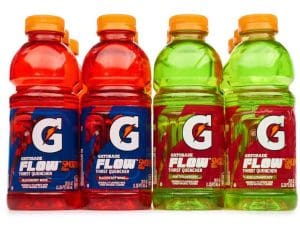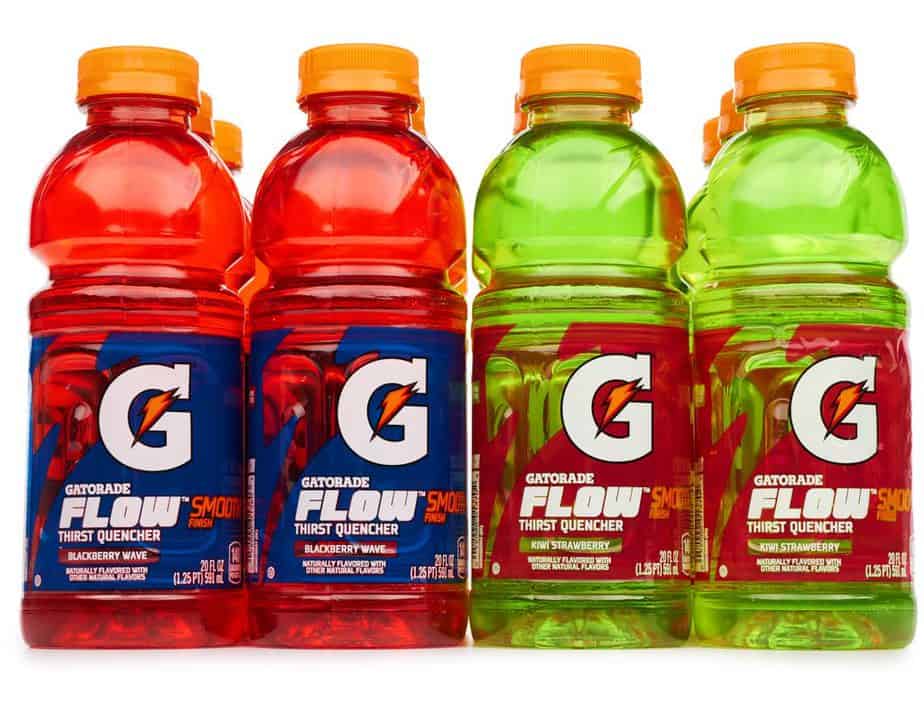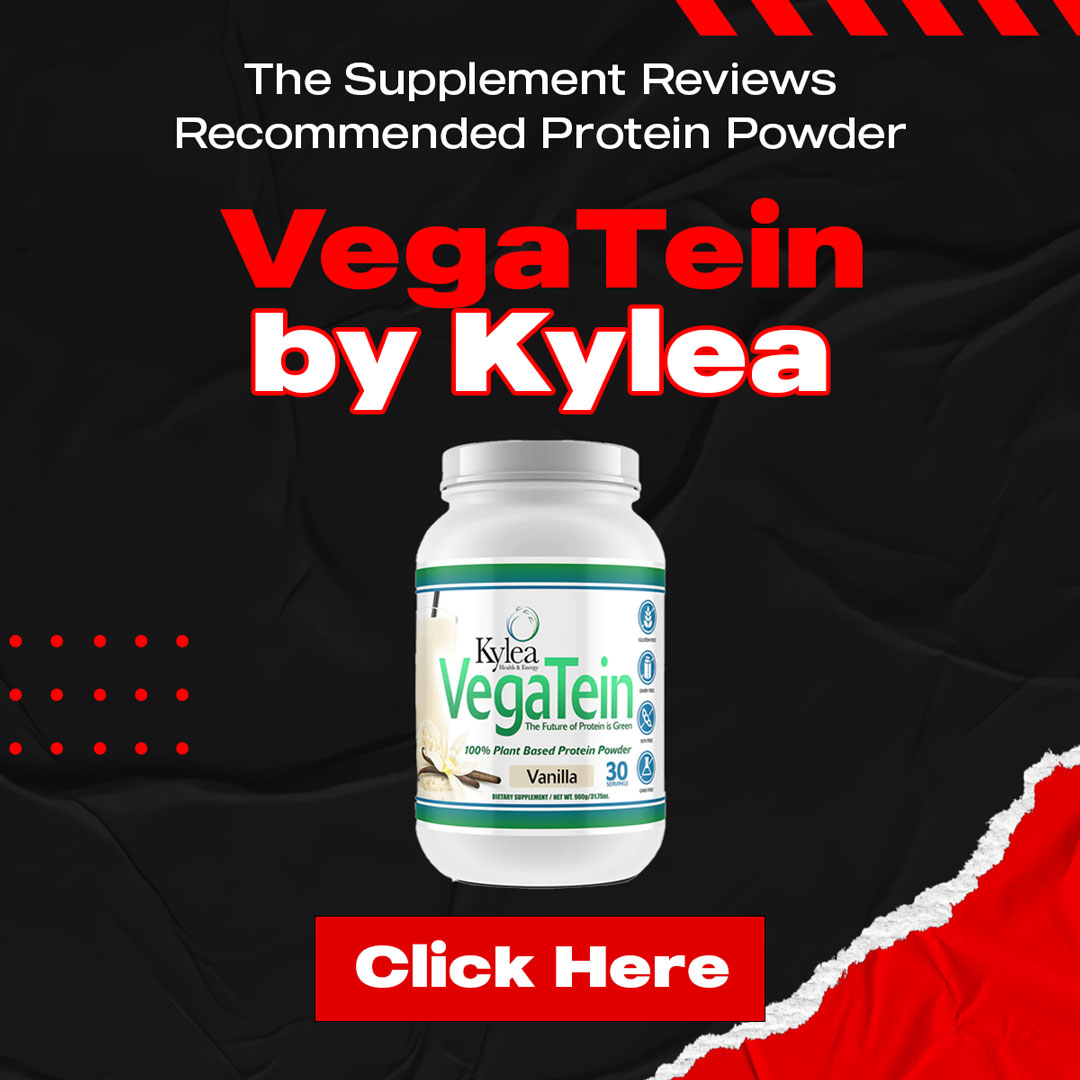
Gatorade has long been the go-to water cooler drink for athletes of all levels. The bright-colored sports drink giant clocked in $5 billion revenue in its last earnings report, blowing nearly every competitor out of the water.
But there’s at least one game where Gatorade can’t seem to pull off the win: hydration.
Enterade ORS & BCAA vs Gatorade
In a recent study published in the American Journal of Clinical Nutrition, another “ade”—an amino acid drink known as enterade ORS—beat Gatorade on the Beverage Hydration Index (BHI). Not only did the amino acid drink provide better short-term hydration; it also did so with far fewer calories and no added sugar. (Gatorade has 28 grams of sugar in a 16-ounce serving. Yikes.)
This is all a fancy way of saying that if you’re relying on Gatorade to keep you hydrated, it’s time to switch strategies. It’s also an indication that amino acids are even more powerful than researchers thought. Here are a few other reasons why amino acids matter.
Behold, the power of amino acids
We don’t have to tell you that protein is essential to both muscle growth and overall good health. But the building blocks of this building block of life—the 20 amino acids—are just as noteworthy as protein itself. As in, your body needs them to build and repair protein.
With that definition, it’s safe to say all amino acids are essential. But the label of “essential” amino acids is given to the ones your body can’t produce on its own; these are the ones you must get through food. The non-essential amino acids—which, we might add, are still crucial for good health—are ones your body can make on its own. The amino acids falling into the “non-essential” camp include alanine, asparagine, aspartate, arginine, cysteine, glycine, glutamine, proline, serine, ornithine and tyrosine.
Glutamine is the most common amino acid in the body. In fact, more than 60% of your skeletal muscle is made of it. L-Glutamine is found in many sports nutrition supplements, as it can boost the metabolism within your protein and prevent muscle from breaking down.
You’ll see arginine (also known as L-Arginine) in the top-quality nitric oxide supplements. Why? Because this non-essential amino acid triggers the lease of nitric oxide, thus ensuring your muscles get all the oxygen they need to perform at their best for longer. One study showed that cyclists who took the amino acid in powdered form had a 16.7% better anaerobic threshold after three weeks than the unlucky cyclists who were only given a placebo.
Tyrosine, commonly found in meat, fish, eggs and beans, is used within the body to create chemical messengers involved with the brain. It’s crucial for mental alertness.
Because they can’t be produced effectively during times of significant illness or stress, these non-essential aminos are also considered conditional: arginine, cysteine, glutamine, glycine, ornithine, proline, serine and tyrosine.
Gatorade vs BCAA study
You might be wondering about the amino acid drink used in the Gatorade study. Enterade ORS explains it in a kind of clunky way on its website, so allow us to break it down for you. Essentially, the drink includes various amino acids that rebuild damaged GI structures (just like they build other protein structures throughout your body). By doing so, they get your intestines back in working order to ward off hydration. GI issues can cause large amounts of fluids to be lost from the body, thus leading you to become dehydrated.
Why BCAAs Are Better Than Gatorade
Now, back to the amino acids themselves—mainly, the essential ones. Since these are not produced inside the body, you need to get them through foods or supplements. The essential amino acids include histidine, lysine, methionine, phenylalanine, threonine, tryptophan and three branched-chain amino acids we’ll discuss in just a bit.
Lysine produces carnitine, which transforms your fatty acids into energy. Tryptophan, which most of us associate with too much turkey, is crucial to the biosynthesis of proteins. (It also balances our hormones, which explains its propensity for bringing on sleepiness.)
The BCAAs are an even more special subset of the essential amino acids. These aminos play a central role in strengthening and maintaining your muscles, which they do by regulating the breakdown of protein in the body. Hence bodybuilders’ love affair with the three BCAAs: isoleucine leucine and valine.
Countless studies reaffirm the importance of the BCAAs. These aminos decrease fatigue both during and after intense physical activities. During your workout, the BCAAs are also released into your muscles, keeping your glucose levels in check. Leucine is one of the best of the pack for stimulating muscle growth, and when isoleucine and valine enter your blood plasma, they turn into glucose that boosts your energy levels at the gym (or anywhere else, for that matter).
Simply put, BCAAs are key to gaining muscle mass.
Where can you find the essential amino acids? Animal sources of protein usually provide all the amino acids necessary. Fruits, veggies, nuts, seeds and grain can give you some, but typically not all, of the essential amino acids.
Want all nine in one fell swoop? Then consider complete proteins your best friend. These include things like poultry, fish and eggs. High-quality protein powders pack a powerful punch of amino acids; look for ones that include plenty of BCAAs to fuel your fitness goals. You’ll also find certain amino acids in most nitric oxide supplements.
View our top rated protein powders here: Top Whey Protein Supplements.
I’m not just a supplement analyst. I’m an extremely qualified one! I am a Certified Nutrition Coach (CNC) and actually received my certification directly from the National Academy of Sports Medicine. I am also a Nutrition & Wellness Consultant, certified by the American Fitness Professionals Association (AFPA).



